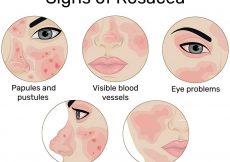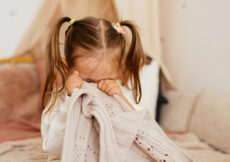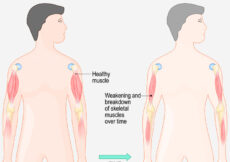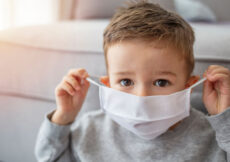Bronchitis in kids is a viral or bacterial infection characterized by the inflammation of the lining of the lungs’ large breathing tubes (bronchi). This lining makes mucus and protects the underlying tissues. When the lining is inflamed, it makes a lot of mucus, making it difficult for the air to pass through and reach the lungs. The main symptom of the infection is cough. Children may have dry coughs or wet coughs with mucus (1) (2).
Read the post to know about the types, causes, symptoms, diagnosis, and treatment of bronchitis in children.
Types And Causes Of Bronchitis In Children
Bronchitis-causing pathogens spread through the mucus and saliva of the infected person (1) (3) (4).
1. Acute bronchitis
- It is a temporary inflammation of the bronchi caused by bacteria or viruses.
- It may also be caused by dust, allergens, fumes, cleaning chemicals, or tobacco smoke.
- Acute bronchitis usually occurs after a common cold or upper respiratory tract infection.
- Although it may affect people of all ages, it is most common in children under five.
- The infection is mostly mild and lasts for about three weeks.
2. Chronic bronchitis
- The main cause of the infection is smoking and being around tobacco smoke or chemical fumes for a long time.
- It is rare in children and mostly affects people over 40.
- The infection may be mild or severe and may last several months to a couple of years.
Signs And Symptoms Of Bronchitis In Children
The primary symptom of the condition is a dry, non-productive cough or wet cough with thick yellow, white, or green mucus. Children may also experience the following symptoms (1) (4).
- Runny nose
- Sore throat
- Soreness and tightness in the chest
- Headache
- Fever and chills
- Discomfort in the body
- Muscle pain
- Shortness of breath
- Wheezing due to inflamed bronchi
- Vomiting due to mucus in young children
The symptoms may last for one to four weeks; however, the cough may stay for some time even after the symptoms have disappeared (3).
You should see a doctor if children have (3) (5):
- A temperature of 100.4°F (38°C) or higher
- A high temperature for more than three days (the sign of flu or pneumonia)
- Cough with blood in mucus
- Shortness of breath
- Frequent bronchitis
Risks And Complications Of Bronchitis In Children
The presence of the following conditions may increase the child’s risk of developing bronchitis (6).
- Allergies
- Chronic sinusitis
- Asthma
- Enlarged tonsils and adenoids
- Secondhand smoke
Most children recover without major issues. Bronchitis may sometimes lead to pneumonia, the most common complication. Pneumonia occurs when the lungs’ air sacs are infected and fill up with fluid (3).
Diagnosis Of Bronchitis In Children
Healthcare providers diagnose bronchitis in children based on the medical history and physical examination. They check the child’s chest to detect wheezing or congestion during the examination. They also suggest diagnostic tests to rule out further complications (4) (6).
- Chest X-ray to detect any sign of infection in the tissues, organs, and bones.
- Pulse oximetry to measure the amount of oxygen in the blood.
- Sputum and nasal discharge sample test (culture) to detect the germs causing the infection.
- Blood tests to check for blood cell count.
- Spirometry breathing test to detect asthma signs in some children.
Treatment For Bronchitis In Children
Acute bronchitis gets better on its own; however, doctors may suggest some treatments based on the child’s medical history, overall health, and the condition’s severity (1) (3) (4).
1. Antibiotics are often not prescribed since most bronchitis infections are viral. Nevertheless, the doctor may prescribe antibiotics if the causative agent is detected to be bacteria. Doctors may also suggest antibiotics if:
- There is an increased risk of pneumonia
- The child has a weak immune system
- There is a history of lung, heart, kidney, and liver disease
2. Analgesics such as acetaminophen are given to treat fever.
3. Cough medications may be given to children between the ages of six and 12 years only when prescribed by the doctor.
4. Bronchodilators or other anti-asthma medicines may be suggested if the child has persistent coughs and wheezing. These medicines are given through inhalers or nebulizers.
Home Remedies For Bronchitis
Bronchitis in children may be managed at home through the following remedies (5) (7).
- Allow them to rest well.
- Give plenty of fluid to prevent dehydration, along with nutritious food.
- Encourage children to exercise moderately.
- Use a cool-mist humidifier to help breathe comfortably.
- Use a saline nasal spray to decongest a stuffy nose. For younger children, a rubber suction bulb may be used.
- Use steam to decongest the lungs. You may even fill the room or bathroom with steam and let children sit there for some time.
- Children over four years may also suck lozenges to relieve the irritation in the throat and suppress the cough.
Here are some natural remedies that may also work.
- For children above one year, you may use honey to relieve sore throat.
- Encourage older children to gargle with warm salt water as it helps to soothe the sore throat.
- Ginger is widely used to relieve cold, cough, and bronchitis symptoms. Crushed fresh ginger may be boiled in water and taken at regular intervals during the day.
- Pineapple suppresses cough and loosens mucus as it contains a protein-digesting enzyme called bromelain.
- Grapes help to release mucus from the affected respiratory passages.
- Breathing the strong vapor of onion may also help in relieving cough.
- Probiotics may be given to children to strengthen their immune systems.
- Turmeric and black pepper may be boiled in water and taken to relieve dry cough (8).
Prevention Of Bronchitis In Children
Prevention of bronchitis is possible by following these tips (1) (2) (9).
- Wash hands with soap and warm water.
- Do not touch the face often.
- Use your elbow or a tissue to cough or sneeze.
- Do not let children be around secondhand tobacco smoke.
- Encourage children to wear masks near irritants, such as automobile smoke, dust, or chemical fumes.
- Ensure that your child gets the flu shot every year.
Conclusion
Bronchitis in children is usually not serious, but early treatment is necessary to avoid complications. If you feel your child is showing bronchitis symptoms, start with home remedies to prevent the infection from growing. Take advice from your doctor on appropriate treatment options.
References:
MomJunction’s articles are written after analyzing the research works of expert authors and institutions. Our references consist of resources established by authorities in their respective fields. You can learn more about the authenticity of the information we present in our editorial policy.
The following two tabs change content below.




































